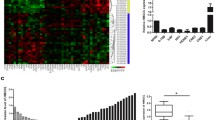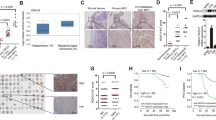Abstract
Background
Cancer stem cell phenotype confers tumor aggressiveness in multiple malignancies, including nasopharyngeal carcinoma (NPC). Many studies supported that β-hydroxybutyrate (BHB), a ketone body, acts as an epigenetic factor with an anticancer effect. Nevertheless, the effects of BHB on NPC remain elusive.
Objective
This study explored whether BHB suppressed the aggressive phenotype of NPC cells by suppressing their stemness-like characteristics and exerting an anti-NPC effect.
Results
The proliferation, migration, and invasion abilities of NPC cells after BHB intervention were attenuated, the protein levels of E-cadherin were downregulated, that of N-cadherin and vimentin were upregulated, the volume and number of cell spheres were reduced, and the number of CD44 + cells (cell surface stem cell marker) was reduced. Knockdown of HDAC4 abrogated the effects of BHB on cell proliferation, invasive phenotype, and stemness. The molecular docking map of BHB-HDAC4 displayed that BHB binds the catalytic domain in HDAC4, speculating that BHB functions as an HDAC4-specific inhibitor, preventing the catalytic function of HDAC4 protein rather than inhibiting the translational synthesis of HDAC4 protein.
Conclusions
BHB inhibited NPC cells’ proliferation, stemness characteristics, and invasive phenotypes by specifically restraining HDAC4 expression.





Similar content being viewed by others
Data availability
The datasets generated during and/or analysed during the current study are available from the corresponding author on reasonable request.
References
Allen BG et al (2013) Ketogenic diets enhance oxidative stress and radio-chemo-therapy responses in lung cancer xenografts. Clin Cancer Res 19:3905–3913
Baloche V et al (2020) Emerging therapeutic targets for nasopharyngeal carcinoma: opportunities and challenges. Expert Opin Ther Targets 24:545–558
Barry D et al (2018) The ketogenic diet in disease and development. Int J Dev Neurosci 68:53–58
Bonuccelli G et al (2010) Ketones and lactate “fuel” tumor growth and metastasis: evidence that epithelial cancer cells use oxidative mitochondrial metabolism. Cell Cycle 9:3506–3514
Brabletz T et al (2005) Opinion: migrating cancer stem cells - an integrated concept of malignant tumour progression. Nat Rev Cancer 5:744–749
Chae YC, Kim JH (2018) Cancer stem cell metabolism: target for cancer therapy. BMB Rep 51:319–326
Chen YC et al (2016) High-throughput single-cell derived sphere formation for cancer stem-like cell identification and analysis. Sci Rep 6:27301
Chen YP et al (2019) Nasopharyngeal carcinoma. Lancet 394:64–80
Cheng C et al (2021) HDAC4 promotes nasopharyngeal carcinoma progression and serves as a therapeutic target. Cell Death Dis 12:137
Clevers H (2011) The cancer stem cell: premises, promises and challenges. Nat Med 17:313–319
Dmitrieva-Posocco O et al (2022) β-Hydroxybutyrate suppresses colorectal cancer. Nature 605:160–165
Evangeliou AE et al (2022) Restricted ketogenic diet therapy for primary lung cancer with metastasis to the brain: a case report. Cureus 14:e27603
Guan S, Wei J, Huang L, Wu L (2020) Chemotherapy and chemo-resistance in nasopharyngeal carcinoma. Eur J Med Chem 207:112758
Hao D et al (2014) Evaluation of E-cadherin, β-catenin and vimentin protein expression using quantitative immunohistochemistry in nasopharyngeal carcinoma patients. Clin Invest Med 37:E320-330
Huang T et al (2020) Stem cell programs in cancer initiation, progression, and therapy resistance. Theranostics 10:8721–8743
Janisiewicz AM et al (2012) CD44(+) cells have cancer stem cell-like properties in nasopharyngeal carcinoma. Int Forum Allergy Rhinol 2:465–470
Jemal M, Molla TS, Asmamaw DT (2021) Ketogenic diets and their therapeutic potential on breast cancer: a systemic review. Cancer Manag Res 13:9147–9155
Ji CC et al (2020) A ketogenic diet attenuates proliferation and stemness of glioma stem-like cells by altering metabolism resulting in increased ROS production. Int J Oncol 56:606–617
Khoziainova S, Rozenberg G, Levy M (2022) Ketogenic diet and beta-hydroxybutyrate in colorectal cancer. DNA Cell Biol 41:1007–1011
King J, Patel M, Chandrasekaran S (2021) Metabolism, HDACs, and HDAC inhibitors: a systems biology perspective. Metabolites 11(11):792
Lam WKJ, Chan JYK (2018) Recent advances in the management of nasopharyngeal carcinoma. F1000Res 7:1829
Lan Y et al (2022) Ketogenic diets and hepatocellular carcinoma. Front Oncol 12:879205
Lopaschuk GD et al (2010) Myocardial fatty acid metabolism in health and disease. Physiol Rev 90:207–258
Lu Y et al (2021) Epigenetic inactivation of Acetyl-CoA acetyltransferase 1 promotes the proliferation and metastasis in nasopharyngeal carcinoma by blocking ketogenesis. Front Oncol 11:667673
Ludwig DS (2020) The ketogenic diet: evidence for optimism but high-quality research needed. J Nutr 150:1354–1359
Luo W et al (2017) Inactivation of HMGCL promotes proliferation and metastasis of nasopharyngeal carcinoma by suppressing oxidative stress. Sci Rep 7:11954
Martinez-Outschoorn UE et al (2012) Ketone body utilization drives tumor growth and metastasis. Cell Cycle 11:3964–3971
Mikami D et al (2019) β-Hydroxybutyrate, a ketone body, reduces the cytotoxic effect of cisplatin via activation of HDAC5 in human renal cortical epithelial cells. Life Sci 222:125–132
Mittal V (2018) Epithelial mesenchymal transition in tumor metastasis. Annu Rev Pathol 13:395–412
Najafi M, Mortezaee K, Majidpoor J (2019) Cancer stem cell (CSC) resistance drivers. Life Sci 234:116781
Okechukwu CE (2022) Cross talk between the ketogenic diet and metastatic prostate cancer cells. World J Mens Health 40:162–163
Peng S et al (2018) Snail-mediated cancer stem cell-like phenotype in human CNE2 nasopharyngeal carcinoma cell. Head Neck 40:485–497
Plotti F et al (2020) Diet and chemotherapy: the effects of fasting and ketogenic diet on cancer treatment. Chemotherapy 65:77–84
Poff A et al (2019) Targeting the Warburg effect for cancer treatment: ketogenic diets for management of glioma. Semin Cancer Biol 56:135–148
Sampaio LP (2016) Ketogenic diet for epilepsy treatment. Arq Neuropsiquiatr 74:842–848
Shakery A et al (2018) Beta-hydroxybutyrate promotes proliferation, migration and stemness in a subpopulation of 5FU treated SW480 cells: evidence for metabolic plasticity in colon cancer. Asian Pac J Cancer Prev 19:3287–3294
Shimazu T et al (2013) Suppression of oxidative stress by β-hydroxybutyrate, an endogenous histone deacetylase inhibitor. Science 339:211–214
Singh T et al (2022) Differential molecular mechanistic behavior of HDACs in cancer progression. Med Oncol 39:171
Skandalis SS, Karalis TT, Chatzopoulos A, Karamanos NK (2019) Hyaluronan-CD44 axis orchestrates cancer stem cell functions. Cell Signal 63:109377
Stronach EA et al (2011) HDAC4-regulated STAT1 activation mediates platinum resistance in ovarian cancer. Cancer Res 71:4412–4422
Su J et al (2011) Identification of cancer stem-like CD44+ cells in human nasopharyngeal carcinoma cell line. Arch Med Res 42:15–21
Telang N. (2022) Stem Cell Models for Cancer Therapy. Int J Mol Sci 23.
Thomas JG, Veznedaroglu E (2020) Ketogenic diet for malignant gliomas: a review. Curr Nutr Rep 9:258–263
Wang Z, Qin G, Zhao TC (2014) HDAC4: mechanism of regulation and biological functions. Epigenomics 6:139–150
Wang Y, Zhang GH, Li SL (2015) Isolation and phenotypic characterization of cancer stem like cells from nasopharyngeal carcinoma. Drug Res (stuttg) 65:323–326
Weber DD et al (2020) Ketogenic diet in the treatment of cancer - where do we stand? Mol Metab 33:102–121
Wei R et al (2022) Ketogenesis attenuates KLF5-dependent production of CXCL12 to overcome the immunosuppressive tumor microenvironment in colorectal cancer. Cancer Res 82:1575–1588
Xiang Y, Wang M, Miao H (2022) Ketogenic diet: new avenues to overcome colorectal cancer. Signal Transduct Target Ther 7:262
Xiao Q et al (2022) The ketogenic diet could improve the efficacy of curcumin and Oldenlandia diffusa extract in the treatment of gastric cancer by increasing miR340 expression and apoptosis mediated by autophagy, oxidative stress, and angiogenesis. J Food Biochem 46:e14407
Xie J et al (2021) Targeting cancer cell plasticity by HDAC inhibition to reverse EBV-induced dedifferentiation in nasopharyngeal carcinoma. Signal Transduct Target Ther 6:333
Yang J et al (2022a) HDAC4 mediates smoking-induced pancreatic cancer metastasis. Pancreas 51:190–195
Yang L et al (2022b) Ketogenic diet and chemotherapy combine to disrupt pancreatic cancer metabolism and growth. Med (n Y) 3:119–136
Ye L et al (2021) Dihydromyricetin exhibits antitumor activity in nasopharyngeal cancer cell through antagonizing Wnt/β-catenin signaling. Integr Cancer Ther 20:1534735421991217
Zang WJ et al (2022) HDAC4 promotes the growth and metastasis of gastric cancer via autophagic degradation of MEKK3. Br J Cancer 127:237–248
Zhang Y, Weinberg RA (2018) Epithelial-to-mesenchymal transition in cancer: complexity and opportunities. Front Med 12:361–373
Acknowledgments
The authors have no acknowledgments.
Funding
No funding was received.
Author information
Authors and Affiliations
Contributions
JH designed the research plan. JH, XC, HL, and XC performed the experiments and analyzed the data. JH and XC wrote the manuscript.
Corresponding author
Ethics declarations
Conflict of interest
JH, XC, HL and XC have no conflict of interest to declare.
Ethical approval
This article contains no studies with human participants or animals performed by authors.
Additional information
Publisher's Note
Springer Nature remains neutral with regard to jurisdictional claims in published maps and institutional affiliations.
Supplementary Information
Below is the link to the electronic supplementary material.
Rights and permissions
Springer Nature or its licensor (e.g. a society or other partner) holds exclusive rights to this article under a publishing agreement with the author(s) or other rightsholder(s); author self-archiving of the accepted manuscript version of this article is solely governed by the terms of such publishing agreement and applicable law.
About this article
Cite this article
Huang, J., Chen, X., Lin, H. et al. β-hydroxybutyrate impairs nasopharyngeal carcinoma cell aggressiveness via histone deacetylase 4 inhibition. Mol. Cell. Toxicol. (2023). https://doi.org/10.1007/s13273-023-00378-7
Accepted:
Published:
DOI: https://doi.org/10.1007/s13273-023-00378-7




